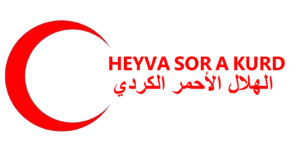Early detection of breast cancer is one of the most important services of the Pink Month.




In light of the crises affecting the city of Al-Hasakah, the efforts of the Kurdish Red Crescent stand out as a significant example of important humanitarian work. The organization is striving to provide clean drinking water to the residents in collaboration with Medico Switzerland, in response to the current situation. These efforts come at a critical time, as the city is experiencing a severe water shortage, which negatively impacts public health and exacerbates living conditions due to the lack of water from the Alouk station. These ongoing campaigns highlight the importance of community cooperation and coordination among communes and humanitarian organizations to address urgent challenges
Internal clinics in the Kurdish Red Crescent facilites play a vital role, where they are providing basic and essential health care that helps maintain the health of residents and displaced people inside and outside camps.
In the Washokani camp for displaced people, that located west of the city of Hasakah, the internal clinic of the Kurdish Red Crescent Center for Primary Health Care provides its services such as examinations, echo diagnosis, laboratory diagnosis, monitoring of patients with chronic diseases, evaluation and referral of infectious diseases, and providing medical, psychological and other guidance for all age groups, at a rate ranging between 30-40 beneficiaries every day.





The Kurdish Red Crescent, with the support and cooperation of the Area Metropolitana de Barcelona (AMB) and Mezzaluna Rossa Kurdistan Italia Onlus, has launched an important initiative to construct two wells equipped with solar energy systems. This project aims to provide sustainable solutions for accessing clean drinking water near the Serdem and Berxdan camps and medical points in the Shahba region, which is experiencing a massive influx of displaced persons, particularly from Afrin, due to the dire humanitarian conditions faced by the population.



The residents of Shahba face numerous challenges, as the area has been affected by various health and environmental crises, ranging from the outbreak of the COVID-19 pandemic to the devastating earthquake that struck northern and western Syria last year. Therefore, the provision of clean drinking water is a pressing necessity for the health of the local community and is a significant step towards enhancing essential infrastructure and improving the daily living conditions for the displaced, as well as reducing reliance on non-renewable resources through the use of solar energy systems.




Qamishlo city /Al-Antarya neighborhood
A1- 00963 935 288 541
A2- 00963 949 359 179
A3- 00963 949 356 870
A4- 00963 932 125 933
